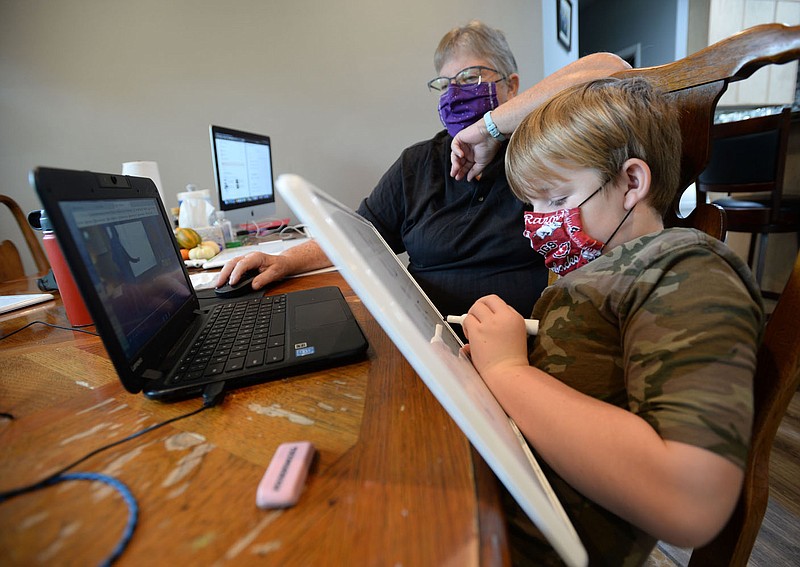Arkansas public school systems that did not previously submit plans to the state by a May 1 deadline to offer remote instruction to their students in the coming school year are getting another bite at the apple.
The Arkansas Division of Elementary and Secondary Education announced Friday that it is offering districts that did not submit digital learning plans for state review and Board of Education approval the opportunity to do so now, using a modified process.
The offer to reopen the opportunity for school districts to provide remote online instruction comes as the number of covid-19 virus cases in the state spikes to numbers not seen since January and February.
The Aug. 16 start of school is less than a month away, and schools are prohibited by Act 1002 of 2021 from requiring students and employees to wear masks to stem spread of the contagious and sometimes fatal virus.
[CORONAVIRUS: Click here for our complete coverage » arkansasonline.com/coronavirus]
While adults and children 12 and over are eligible to receive covid-19 vaccinations, the vaccinations are not approved for children under 12 years old. The vaccinations also are not absolute insurance against getting the illness.
On Thursday, Sen. Trent Garner, R-El Dorado, the sponsor of Act 1002, said the state should have a policy for remote learning to provide instruction in the event of covid 19 outbreaks that cause schools to have to shut down. He said there would be outbreaks with or without mask mandates.
"[R]ight now I think we are caught flat-footed in actually giving the people that choice," Garner said about remote instruction.
A total of 152 of the state's 262 traditional school districts and charter school systems submitted digital learning proposals for their districts earlier this year. Those plans included requests for waivers of certain state rules and laws that would be barriers to digital learning.
A team of 16 education division staff members reviewed the proposed plans and waivers, sought revisions from the districts and ultimately submitted the final versions to the Education Board, which approved most of them, one by one, over the course of several meetings in June and July.
Friday's memo to school districts spelled out the revised process planned for dealing with the next round of applications.
"Since it is not feasible to review the digital learning plans prior to the start of the 2021-2022 school year, the division will support districts in requesting limited contingency Act 1240 waivers [of state rules and laws] to allow districts a temporary virtual option while their digital learning plan is being reviewed," the education commissioner's memorandum to the districts and posted on the district's website, said Friday.
To take advantage of the opportunity, interested school districts must give notice to the state by 9 a.m. Aug. 2, the memorandum states.
State education leaders will present these contingency waivers to the Arkansas Board of Education at the board's Aug. 12 meeting.
All of the contingency virtual learning plans must follow state mandates in regard to class sizes, teaching load and instructional time. Each school district must agree to submit a full digital learning plan to the state by 5 p.m. Sept. 1.
"If a district's completed plan is not received by the Sept. 1 deadline, waivers granted under the request will expire immediately," the memorandum says.
If a plan is received by the deadline, waivers granted will continue until the digital learning plan is evaluated by the Education Board.
If the state Education Board approves a district's digital instructional plan, the waivers requested in the digital learning plan will replace waivers granted under the short-term contingency request.
The Education Board will decide what happens to the temporary waivers should the board decide against approving a district's plan.
A district that previously had a digital plan approved for specific grade bands (such as ninth-12th or kindergarten-through-fifth), but wants to expand digital instruction to include other grades, will need to participate in this contingency waiver process for those grades, the commissioner's memo states.
State agency staff members will help districts with add-ons to their existing plans.
Districts may also work with educational service cooperatives that earlier formed digital learning consortiums to provide virtual, remote learning to students in the cooperative's member school districts.
It is still the responsibility of a district working with a cooperative, however, to submit a satisfactory digital learning plan to the state by Aug. 2.
In January -- in the midst of a pandemic school year that caused school districts to scramble to provide virtual instruction to many of their students -- the Arkansas Division of Elementary and Secondary Education and the state Education Board invited school districts to submit virtual instruction plans for the coming school year.
With that invitation came the offer of waivers of state rules and laws that cap maximum class sizes to no more than 30 students, limit teacher workloads to no more than 150 students, require 120 clock hours of instruction per course and six-hour instructional days, set student attendance requirements and require a minimum number of recess minutes.
Not all of the newly approved plans incorporate all the waivers.
The school districts responded with a wide range of plans to serve families that choose to have their students educated away from a standard classroom.
Some districts are providing their own lessons that will be taught by their own faculty, who in some cases will simultaneously teach in-person and online students.
Other districts are relying on curriculum and teachers from education vendors such as Edgenuity or Pearson, or from the long-standing Virtual Arkansas organization that provides course work.
Still, other school systems have arranged to have their state education service cooperatives provide the instruction.
Information for this article was contributed by Michael R. Wickline of the Arkansas Democrat-Gazette.
